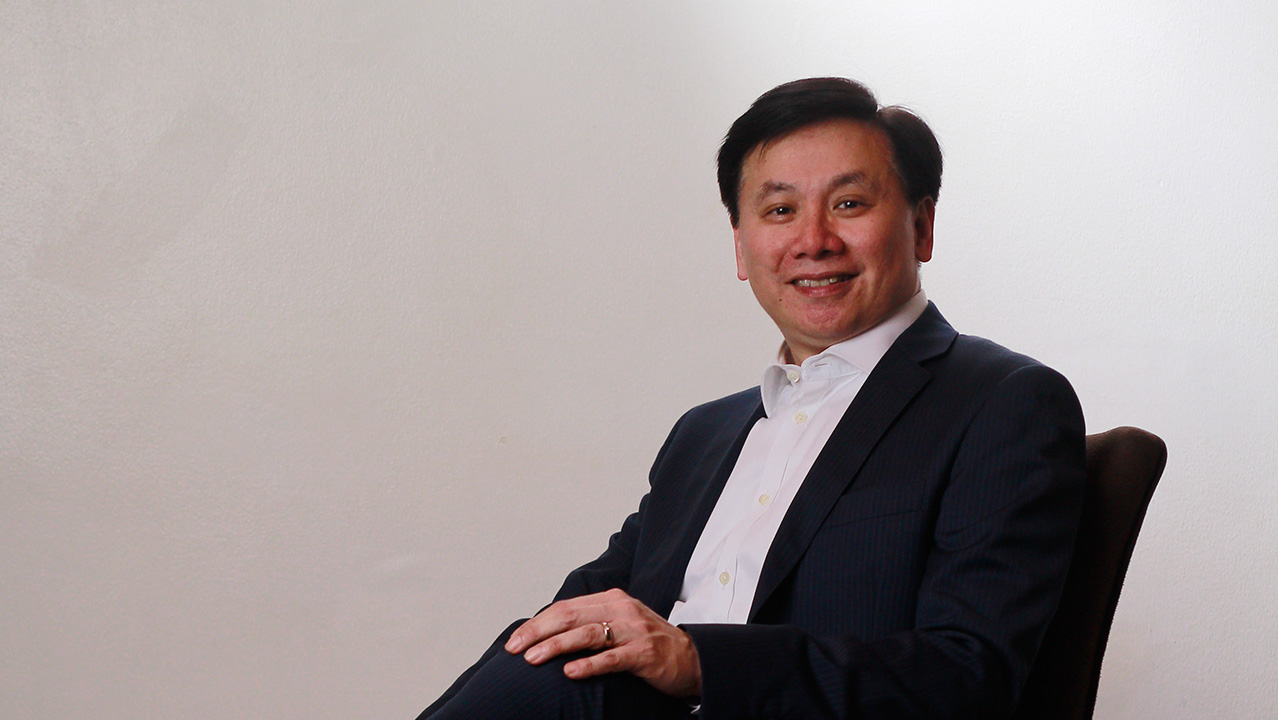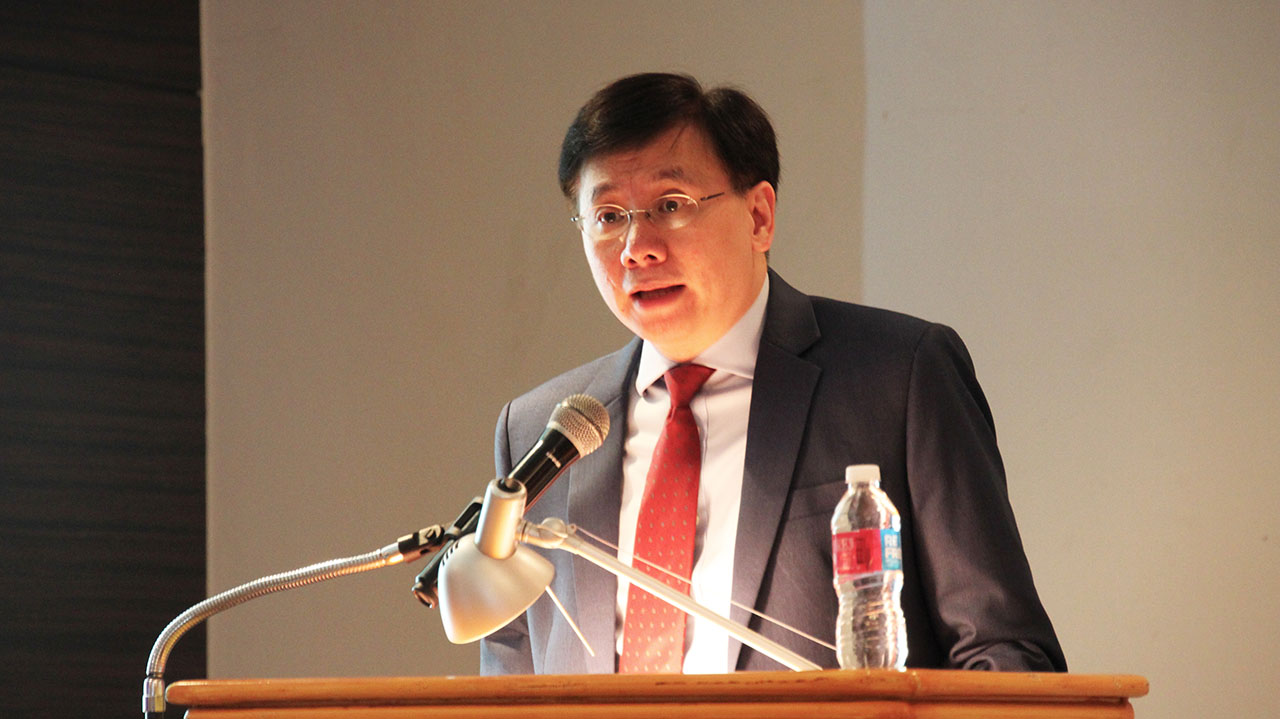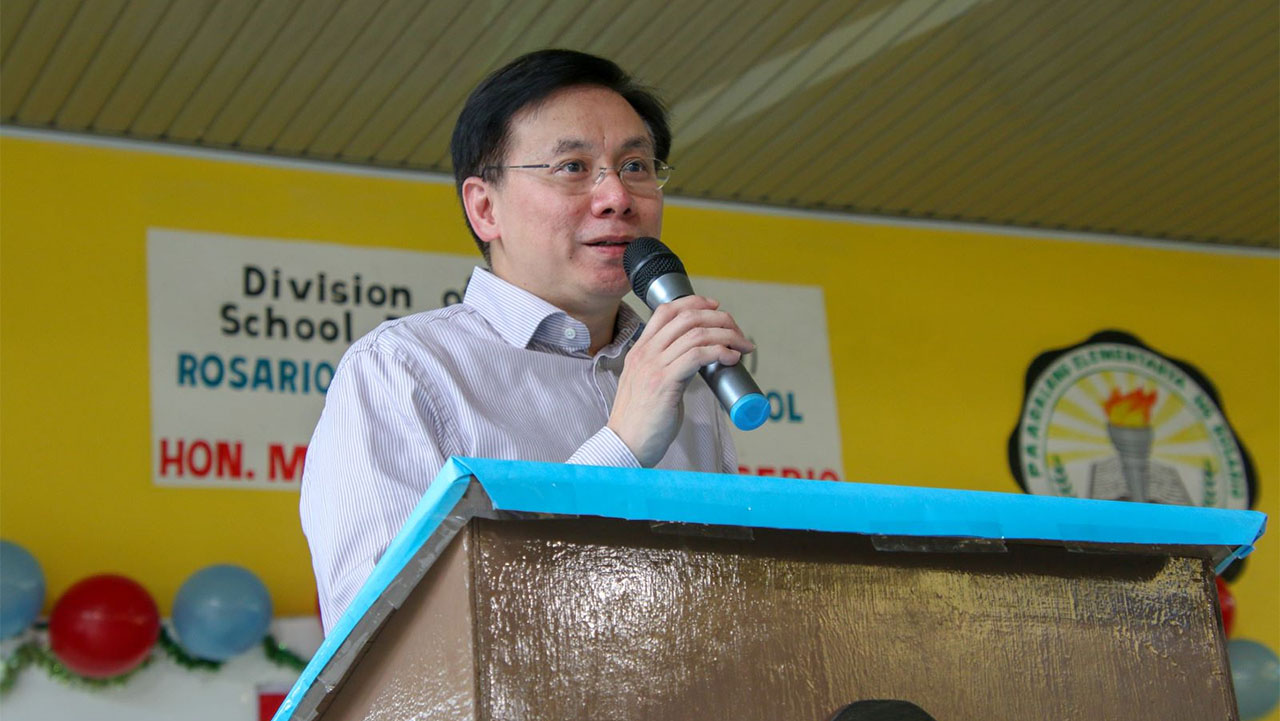It’s late in the afternoon when we catch up with URC President and CEO Irwin Lee, shortly after the company’s annual stockholder meeting wraps up. Buoyed perhaps by the company’s strong first quarter performance, Lee is in a chipper mood. It’s been slightly over a year since he took over the reins at one of the largest branded consumer food and beverage product companies in the Philippines, the first person outside of the Gokongwei family to do so.
So, we ask, what’s it been like in the hot seat? “It actually feels very cool,” says Lee, casually breaking the ice. “It's a very cool thing to come into this period of transition in the company. Yes, people might look at it as a hot seat, but I've had many conversations with [URC Chairman and JG Summit President and CEO] Lance Gokongwei prior to coming in, so I was well prepared for what to expect. I think it's just been a very exhilarating and a very exciting ride this past year. And I think that's going to continue for a number of years to come, because there is a lot to do.”

WORDS OF ADVICE
Lee, who has had 30 years of experience in the consumer goods industry—26 years of them spent overseas, sees his role as someone who will guide the transformation of URC from a successful founder-led company into a leading and sustainable enterprise that will last for generations to come. His strong background should come in handy, but to help him ease into the job, he’s also received words of advice from the Gokongwei family, most especially from the company’s founder, John Gokongwei Jr. “The one thing I really remember was his encouragement to me, saying, ‘You've got to develop a bold vision for the future.’ And I think that's very telling of the success of URC and JG Summit. It reflects the spirit and what makes Mr. John such a great entrepreneur, right? It’s his boldness of vision, his boldness of action.”
From the man he succeeded at the job, Lee picked up on the ethical and sustainable direction the company is pursuing. “When we get into difficult decisions, when we have to assess together, Lance always asks, ‘But what is right for the long term?’ Through all of the noise, the confusion, the conflicting information and data, he goes back to the fundamental question of what is right for the long term.”
Lee looks up to James Go, chairman emeritus of URC, as the company’s sage. “I go to Mr. James for a lot of counsel, a lot of advice. He’s built the business with Mr. John over decades. And he, more than anyone else probably, has a very deep and close technical affinity to the business. He’s built a lot of the business. He knows a lot of the technical foundations of the business by heart.”
URC Vice President Marcia Gokongwei, the youngest of John Gokongwei Jr.’s children, also offered some words of support during Lee’s early days. “I don't know whether she intended to give it to me as a form of advice, but I think it's reflective of the humility of the family. I remember Marcia saying, ‘Don't treat me any differently.’ I took it as a message of equity, of fairness, of professionalism.”
A STRONG FOUNDATION
As Lee got down to business, he saw that URC had a number of strengths, including the founder’s vision and mentality, which Lee sees as a great intangible asset. “The company has a spirit of agility and entrepreneurial flair. That, I think was very, very good.
“I thought it had some really deep technical talent, and very strong technical foundations. Probably because Mr. James is an MIT graduate, and he handpicked most of the production lines.”
Another positive that Lee immediately saw was the strength of URC’s brands. “We are very fortunate to have such a strong portfolio of brands built over decades. It’s a great, great asset to have. A strong brand should never be underestimated. Like Great Taste coffee, which has its ups and downs and had its challenges for the last three years, it's hard to kill a strong brand.”
GETTING DOWN TO BUSINESS
“There’s a flipside to every coin,” says Lee. In contrast to its strengths, there are areas that need improvement, issues, he says, that may have arisen during boom periods. “Success, sometimes insidiously, unconsciously, slips into complacency,” he reflects. “We need a big product supply chain transformation. The product supply chain, from procurement and manufacturing to supply chain factory logistics, have for many years been coping with growth, such that we have not kept up on being world-class. I see a lot of opportunities for improving efficiency, for savings, for cost improvement, for better coordination, for better integration of functional silos.”

Addressing shareholders at the Annual Stockholders' Meeting, held on May 29, 2019, at the Crowne Plaza Manila Galleria.
Lee also sees a golden opportunity to become once more a “partner of choice,” being the first brand wholesalers and retailers think about when stocking up on products. “In the past, when the customers were ordering 100, for example, we were delivering 70, because our product supply chain wasn't efficient. It’s an area which we’re working very hard to improve on.”
The third area for improvement centers on the company being “people-friendly.” While Lee sees a strong culture of positivity emanating from URC, he thinks it hasn’t yet unleashed the full potential of its employees. “We don't empower people. We don't drive delegation of authority down. We still have a lot of manual processes. In that way, we're not people-friendly, there’s a lot of inefficiency.”
To rationalize this, he points out that in the last decade alone, URC has nearly doubled its revenue, going from 67.2 billion in 2011 to 127.8 billion in 2018. “In 2019, we’re going to be probably 140 billion. The business has doubled, so imagine the complexity. It is no longer possible to use old processes and old methodologies. And I think that’s part of the transformation. So when we say we need to become a more people-friendly culture, it's a transformation.”
RECLAIMING THE THRONE
Lee, who placed 3rd in the CPA exams upon his graduation from De La Salle University, is a numbers guy. “People will probably say I’m very analytical and data driven. I was trained as an accountant, so I can't help it. I remember the numbers. I'm data driven, because I believe data is the antidote to opinions and stripes management. Stripes management means the person with more ‘stripes,’ has the right answer. But not necessarily, right? In a management landscape where people are shouting opinions, emotions, and all of that, I find there's no better antidote. Let's start with the data. What does the data say? You don’t always have complete data, but at least when you start with data, you defuse the tension of emotions and opinions.”
Naturally, over the course of our conversation, he rattles off some numbers. “We have 16 factories in BCFG, we have six sugar mills, two flour mills, four farms,” Lee says. “We have 18 factories outside the Philippines, we have a total of 60 facilities. So if I want to touch them all in a year, that’s about 120 days.”
This year alone, traveling has taken a big chunk of Lee’s time, visiting URC facilities across the Philippines and Asia-Pacific, including Indonesia, Malaysia, Myanmar, Australia, New Zealand, Thailand, and Vietnam. Putting forward more numbers, Lee says that the group’s three major divisions, BCFG Philippines, BCFG International, Agro-Industrial commodities, contribute roughly around 60 billion, 45 billion, and 25 billion to the business each year.
Looking at the data, something was affecting the company’s profits in recent years: coffee. “It was very clear that the biggest task on hand last year was to turnaround coffee. We declared it, we didn't shy away from it. We said, we have to fix coffee, because coffee was a major drag. And it is such a big part of our business that all the other businesses cannot compensate when coffee is down double digits.”
The BCFG’s efforts to turn around the coffee business were highlighted by the launch of the new Great Taste White varieties earlier this year (read more about it here). As URC’s first quarter revenues have already increased by 7 percent to 33 billion, Great Taste’s clawing back its market share should help the company realize high single-digit growth for the rest of 2019.
MOVING FORWARD
Early in his stint as URC President, Lee brought the 30 top leaders of URC together to develop what he calls OGSM—Objectives, Goals, Strategies and Measures. “We needed to get the strategic clarity cascaded and visible to everyone at the very beginning, getting everyone on the same page.” As part of the JG Summit conglomerate, URC made sure its OGSM aligned with the parent company.
Helping JG Summit get where it wants to go, it has put forward four thrusts—people development, a customer-centric culture, purpose/sustainability, and digital transformation. “We've embedded all those four into what we're doing. When you look at, for example, purpose and sustainability, you can see it play out in our objective to become a leading sustainable enterprise. But it also plays out in our people and planet-friendly culture,” says Lee. “We've done a lot of baselining in 2018, we've now declared our sustainability goals targets. When you talk about digitalization, we have a digital transformation overdrive strategy that permeates across all of our strategic thrusts. So in URC, we talk about how to enable the digital customer, digital consumer, digital operations, and a digital employee. Digital employee will help us in our people-friendly culture, because we're going to use portals, digital tools to help simplify the lives of our employees.”

Giving a speech at the Rosario Elementary School, one of the pilot schools of URC's Hidden Hunger Project, which aims to eradicate malnutrition in schools.
Innovation, as always, will continue to play a big part in URC’s future. One aspect Lee wants to focus on is dubbed the “Better for You” platform—products that are natural, healthy, and organic. I think in the past, we have had a little bit of reticence. Maybe we thought, those are small [markets], they’re not exciting enough, maybe they’re a Western trend, not a local trend. We’re waking up to the fact now that those trends are here to stay. We now have the sugar tax. We now have schools banning junk food. We now see a segment of consumers wanting natural, organic.” So in the near future, expect to see sugar-free versions of your favorite drinks and products with lower sodium content as well. Better for You means better for the environment as well, as Lee intends to develop more earth-friendly packaging and lessen URC’s carbon footprint.
A challenge he’s laid down for the BCFG team is how to eat—or drink, in this case—into the share of carbonated soda market. “Why is the carbonated soft drinks market 10 times the size of ready-to-drink tea?” he asks, hoping to unleash the creativity and imagination of his team to do something outside the box.
Of the strategic thrusts, customer-centricity will play a large part in how URC navigates its future. “That’s the heart of our strategy on products and brands,” says Lee. “We’re in the business of developing products and brands people love. It's all about what people love. Oftentimes, we use the business words like consumers and customers, and we forget they’re people. This is about people. It’s about serving people, it's about understanding people, understanding their needs, their wants, their desires, understanding their soul. And if we can do that, well, then we're going to be unbeatable.”
To find out more about URC and its portfolio of products, click here.
To read URC's 2018 Annual Report, click here.


